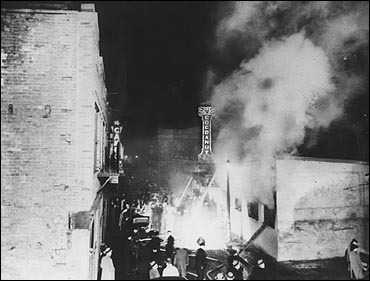http://en.wikipedia.org/wiki/Great_Boston_Fire_of_1872
Notable events of the fire:
Author Oliver Wendell Holmes, Sr. watched the fire from his home on Beacon Hill. He wrote a poem about the event called "After the Fire".
Alexander Graham Bell wrote his own eyewitness account of the fire in a letter to the newspaper The Boston Globe. Unimpressed by Bell's prose, the paper did not publish his letter.
The Great Chicago Fire had occurred just one year earlier, in October 1871.
A committee of concerned citizens and property owners who were deputized to demolish buildings in the path of the fire with gunpowder kegs. The explosions did more harm than good by most accounts.
The glow in the sky over the fire was noted in ship's logs off the coast of Maine.
Fire departments from every state in New England, except Vermont, arrived on trains carrying pumpers, fire fighters and more spectators.
Of these were two Amoskeag Steamers from Manchester, New Hampshire. One was the first Amoskeag ever constructed (Serial number 1), owned by the Manchester Fire Department; the other was the first self-propelled Amoskeag that the manufacturer sent down. Boston purchased the self-propelled steamer after the fire, impressed with its performance. The self-propelled steamer was the first one in use in the country.[2]
Looters had to be chased out of burning buildings.
Old South Meeting House on Washington Street, the church in which the Boston Tea Revolt was organized, was rescued from the fire by a citizens' brigade of wet blankets[citation needed] as well as the Kearsarge Steam Fire Engine from Portsmouth, New Hampshire....


And then there was the Cocoanut Grove fire more recently in 1942...
http://en.wikipedia.org/wiki/Cocoanut_Grove_fire
The Cocoanut Grove was Boston's premier nightclub during the post-Prohibition 1930s and 1940s. On November 28, 1942, this club was the scene of the deadliest nightclub fire in history,[1] killing 492 people (which was 32 more than the building's authorized capacity) and injuring hundreds more. The enormity of the tragedy shocked the nation and briefly replaced the events of World War II in newspaper headlines. It led to a reform of safety standards and codes across the country, and major changes in the treatment and rehabilitation of burn victims.

 = new reply since forum marked as read
= new reply since forum marked as read


